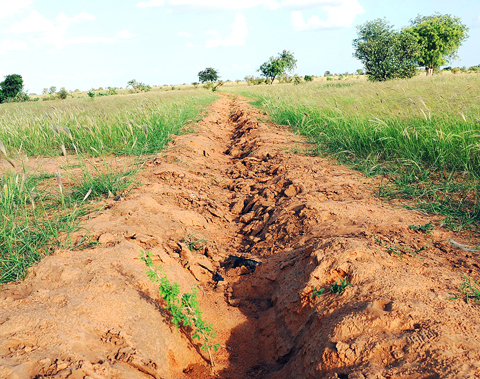The idea was simple, ambitious and eye-catching: To counter the threat of creeping desertification in Africa with a Great Green Wall of trees spanning the continent.
From Senegal in the west to Djibouti in the Horn of Africa in the east, it would be 7,000km long and seek to halt or reverse the encroachment of deserts threatening the livelihoods of tens of millions. Some estimates say up to one-third of Africa’s surface area is at risk.
Senegal’s share of the wall is around 760,000 hectares stretching some 543km in length.

PHOTO: AFP
Sadly, the wall still has a long way to go before it can even come close to achieving its objectives.
The country started planting in 2005, but today it is easy to pass by the tiny trees without even noticing them.
In the savanna of the Sahel region at Ferlo in the north, the countryside is covered in pale green foliage at the end of the rainy season.
“Is that the Great Green Wall that the President [Abdoulaye] Wade talks about all over the world?” a Dakar-based driver asks, failing to hide his disappointment at the first patch of shrubs.
Senegal’s Great Green Wall is not yet a wall and not yet great. In fact it is better described as a series of patches.
In Widoy Thiengoly, the wall is made up of a string of ditches where small shoots of gum trees and date palms are planted. The biggest shoots, planted in 2005, are no more than knee-high.
“In a zone with less than three months of rains you cannot expect spectacular results. These gum trees do not need extra water, they develop their extensive root system first and grow taller very slowly,” said Lieutenant Almamy Diarra of the water and forest service.
“These are trees that support drought very well — in the dry season they shed their leaves to prevent the loss of water,” he said.
The trees are also very well suited to stopping desertification.
Their roots “fix the soil layers and facilitate water infiltration and this creates a microclimate that allows other plants to settle in the same area,” he said.
Statistics in hand, another department official, Souleymane Ndoye, said they replanted 300 hectares in 2005, 400 hectares in 2006 and 675 hectares last year.
“This year the goal was to have 5,000 hectares reforested. With God’s help we planted 5,230,” he said.
“At the moment Senegal does not have the financial means to finish its part of the wall,” Diarra said. “The Great Wall is still tiny.”
The wall project has provided jobs for the village’s young men in the tree nursery, said Kadio Ka, the female chief of the village and a mother of eight.
“When those gum trees mature the whole village will profit from them,” she said.
But ranger Ndoye warns that the villagers will have to be patient.
“Reforestation over a 543km area in Senegal will take several generations,” he said.

In the sweltering streets of Jakarta, buskers carry towering, hollow puppets and pass around a bucket for donations. Now, they fear becoming outlaws. City authorities said they would crack down on use of the sacred ondel-ondel puppets, which can stand as tall as a truck, and they are drafting legislation to remove what they view as a street nuisance. Performances featuring the puppets — originally used by Jakarta’s Betawi people to ward off evil spirits — would be allowed only at set events. The ban could leave many ondel-ondel buskers in Jakarta jobless. “I am confused and anxious. I fear getting raided or even

Kemal Ozdemir looked up at the bare peaks of Mount Cilo in Turkey’s Kurdish majority southeast. “There were glaciers 10 years ago,” he recalled under a cloudless sky. A mountain guide for 15 years, Ozdemir then turned toward the torrent carrying dozens of blocks of ice below a slope covered with grass and rocks — a sign of glacier loss being exacerbated by global warming. “You can see that there are quite a few pieces of glacier in the water right now ... the reason why the waterfalls flow lushly actually shows us how fast the ice is melting,” he said.

RISING RACISM: A Japanese group called on China to assure safety in the country, while the Chinese embassy in Tokyo urged action against a ‘surge in xenophobia’ A Japanese woman living in China was attacked and injured by a man in a subway station in Suzhou, China, Japanese media said, hours after two Chinese men were seriously injured in violence in Tokyo. The attacks on Thursday raised concern about xenophobic sentiment in China and Japan that have been blamed for assaults in both countries. It was the third attack involving Japanese living in China since last year. In the two previous cases in China, Chinese authorities have insisted they were isolated incidents. Japanese broadcaster NHK did not identify the woman injured in Suzhou by name, but, citing the Japanese

RESTRUCTURE: Myanmar’s military has ended emergency rule and announced plans for elections in December, but critics said the move aims to entrench junta control Myanmar’s military government announced on Thursday that it was ending the state of emergency declared after it seized power in 2021 and would restructure administrative bodies to prepare for the new election at the end of the year. However, the polls planned for an unspecified date in December face serious obstacles, including a civil war raging over most of the country and pledges by opponents of the military rule to derail the election because they believe it can be neither free nor fair. Under the restructuring, Myanmar’s junta chief Min Aung Hlaing is giving up two posts, but would stay at the